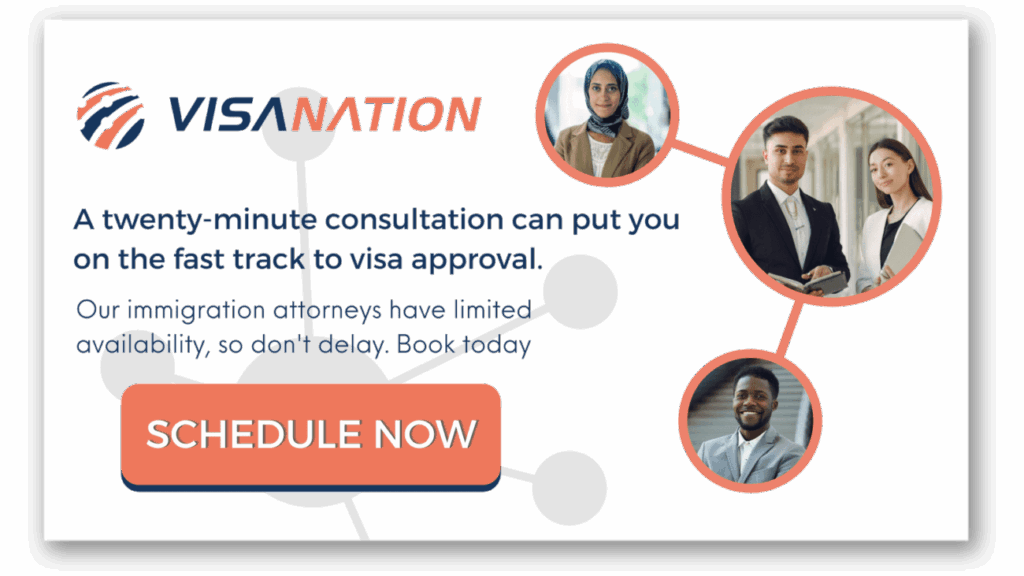The H-1B is a highly coveted visa, and many PhD students and graduates wonder whether it’s a viable option—or whether they can apply for one while still pursuing their degree. In this post, we’ll explore the H-1B visa for PhD students and highlight how having a PhD may give you a competitive edge in securing U.S. employment.
H-1B Overview
If you are a PhD holder or a student considering an H-1B visa, here is a basic overview of the visa and application process.
What is the H-1B?
The H-1B visa is a nonimmigrant visa designed for foreign nationals with specialty occupations. To be considered eligible, you must have a job offer for a specialty position and at least a bachelor’s degree in a related field.
Sponsorship Requirement
Because a sponsoring employer is required, PhD holders cannot self-petition for an H-1B visa. Your employer must submit a Labor Condition Application and file an I-129 petition on your behalf.
The Labor Condition Application form is filed with the Department of Labor and serves to ensure that you are being paid at least the prevailing wage and that hiring you will not adversely affect other employees.
Attorney Brian Thompto of VisaNation notes that if you are in a position to establish your own company, even if you have a controlling ownership interest, you may still be eligible for an H-1B visa if your company qualifies as a cap-exempt sponsor through a formal affiliation with a university or nonprofit research institution.
Your position within the company must still meet the traditional H-1B requirements, including offering a specialty occupation role that requires at least a bachelor’s degree in a specific field, paying the prevailing wage, and establishing a valid employer–employee relationship—demonstrating that the company, not you, controls your employment, even if you are a founder or owner.
H-1B Lottery & Cap Exemption
If you are a PhD student or a graduate interested in the H-1B visa, there are two routes.
- Going through the H-1B lottery
- Applying for a position with a cap-exempt organization
1. Going Through the H-1B Lottery
Every year, USCIS conducts a two-stage H-1B visa lottery to randomly select eligible applicants when the number of H-1B visa applications exceeds the annual limit.
- In the first round, the regular H-1B cap, USCIS uses random selection to choose 65,000 eligible applicants, which includes foreign workers with a Bachelor’s degree and higher.
- USCIS sets aside 6,800 of these H-1B visas exclusively for residents of Chile and Singapore.
- Then comes the H-1B Master’s Cap – a second lottery round with an additional 20,000 visas available exclusively to applicants with a U.S. Master’s degree or higher from eligible universities or institutions.
If your registration is chosen, your employer will then file a Form I-129, Petition for a Nonimmigrant Worker. If your petition is approved, you will receive a notification and be able to start working as an H-1B nonimmigrant after October 1st of that same year.
2. Applying for a Position with a Cap-Exempt Organization
As a PhD holder, you may be well-positioned to apply for an H-1B visa with an H-1B cap-exempt organization. This is particularly so for certain institutes of higher education that offer J-1 or H-1B visas. Cap-exempt organizations can sponsor H-1B visas without any limitations throughout the year, bypassing the lottery.
Only specific organizations are eligible, including
- Institutions of Higher Education
- Nonprofit Organizations Affiliated with Institutions of Higher Education
- Government Research Organizations
- Nonprofit Research Organizations
What is the H-1B Quota for PhD Students?
There is no specific H-1B Quota for PhD students in particular. Rather, there is a set quota for the H-1B lottery overall of 85,000 visas. If USCIS did not select you in the H-1B lottery, you must either:
- apply the following year
- earn a visa from a cap-exempt organization
- or apply for an alternative visa
What Are The Odds of Getting an H-1B Visa with a PhD?
While the H-1B lottery process for PhD holders is not different from the normal process, you have a unique advantage in the lottery. Because petitions not selected in the first stage are re-entered into the Master’s cap, this gives PhD holders a second chance at being selected.
Additionally, due to your qualifications, you likely have a higher chance of earning a place with a cap-exempt organization. Cap-exempt organizations commonly hire PhD students, particularly in fields related to research and academia.
Possibility of Removing Limitations for PhD Holders
In the past, there have been bills introduced that would make an exception for PhD holders. The Stopping Trained in America from Leaving the Economy Act (or STAPLE Act) aimed to exclude PhD holders from the limits placed on H-1B visas and green cards, provided that they have a STEM degree (science, technology, engineering, and mathematics). This would keep highly-skilled workers with PhDs in the U.S. to benefit the economy by facilitating their immigration.
While this change would be beneficial for getting an H-1B for PhD holders, this bill has consistently failed to pass through both chambers of Congress.
H-1B to Green Card for PhD Holders
With an H-1B, you likely want to pursue avenues that make your stay in the U.S. more permanent. For that, you want to go for an employment-based green card.
The most common green cards for H-1B holders are:
EB-3: This green card is meant for those with bachelor’s degrees as well as both skilled and unskilled workers. As a PhD holder, you are probably more than qualified for this green card.
However, for citizens of certain countries, the wait time may be so long that the visa is no longer a realistic option.
EB-2: To be considered eligible for this green card, you must either have an advanced degree or be able to demonstrate exceptional ability in your field. Because you are an H-1B holder with a PhD, this is likely the ideal option for you because the EB-2 generally has a much shorter waiting period.
EB-1: The EB-1 visa classification has the highest requirements, and is split into two categories:
- EB1A – to qualify, PhD holders must demonstrate extraordinary ability in one of the following areas: sciences, arts, education, business, or athletics.
- EB1B – to qualify, PhD holders must be considered outstanding professors or researchers. To prove this, specific evidence must be submitted to USCIS.
Green Card Application Process For H-1B Holders
Once you choose your green card, your employer must file an I-140 petition on your behalf and obtain a PERM Labor Certification. To get the PERM, your employer is required to post job ads for your position and interview likely candidates with the intention of filling your position with a qualified U.S. worker.
When the USCIS receives your I-140, that date will be marked as your priority date. Check this against the final action dates given for your country and green card category according to the monthly visa bulletin released by the Department of State. Once your priority date matches or passes the final action date, you will be able to adjust your status or undergo consular processing.
Because you are already in the U.S. under an H-1B for PhD holders, you are given the option to adjust your status, which simply involves filing an I-485 to adjust from non-immigrant to immigrant status.
You can also choose to go through consular processing, which means that you must go to a U.S. Consulate or Embassy in your home country to take part in an interview with a consular officer. Despite its apparent complexity, this may be the cheaper and faster alternative depending on your unique situation.
Alternatives to the H-1B for PhD Holders
While the H-1B might seem like the ideal visa for PhD holders, the competitiveness of it combined with the relatively small chance of being selected for the lottery can present obstacles. Fortunately, there are alternatives to consider that may be more appropriate based on your circumstances.
J-1 Visa
The J-1 is program-based rather than employer-based, meaning that an educational or research entity can sponsor you. This is especially useful for PhD students, physicians, and anyone else who’s work involves a program on the J-1 list.
The caveat for this visa, however, is the home residency requirement. This means that, after your stay in the U.S. under J-1 status, you must return to your home country and spend a minimum of two years there before returning to the U.S. for another visa or green card.
The way to bypass this requirement is to get a J-1 visa waiver, which you can do by reading this post about the J-1 visa home residency waiver. Additionally, keep in mind that the J-1 visa does not have dual intent, meaning that you cannot pursue a green card while under J-1 status.
O-1 Visa
This non-immigrant visa is reserved for foreign nationals with extraordinary achievement in certain fields. The USCIS provides a near-comprehensive list of evidence that can demonstrate your achievement. If you have held your PhD for some time and have published material in your field, you may qualify.
The main benefit of the O-1 visa is the fact that it can be renewed indefinitely. It is also a dual-intent visa, so pursuing a green card will not incur consequences.
F-1 Visa
Put simply, this is a student visa. If you are on your way to a PhD, you can apply for an F-1 to study in the U.S. Your visa will be valid until a certain time after your graduation, and those with STEM degrees may stay longer.
This visa is not dual intent, and you will need to switch to another visa, such as the H-1B for PhD holders, to apply for a green card.
Can You Do A PhD While on an H-1B?
Pursuing a Ph.D. while on an H-1B visa is possible but comes with significant challenges. H-1B holders must prioritize their employment, and pursuing a full-time Ph.D. could jeopardize their visa status unless it’s done part-time with employer approval.
Additionally, H-1B visa holders are usually ineligible for research or teaching assistantships, grants, or fellowships due to employment restrictions.
However, if an employer is deeply invested in the research, they might fund the Ph.D. and collaborate with the university, though this is rare and logistically complex. Overall, success hinges on employer support, part-time study, and strict adherence to H-1B conditions.
How VisaNation Law Group Immigration Attorneys Can Help
When it comes to the intricacies of immigration law, there is nothing more valuable than having a seasoned expert in your corner.
VisaNation lawyers have helped hundreds of individuals obtain their H-1Bs and similar visas. Schedule your consultation with our office today.










